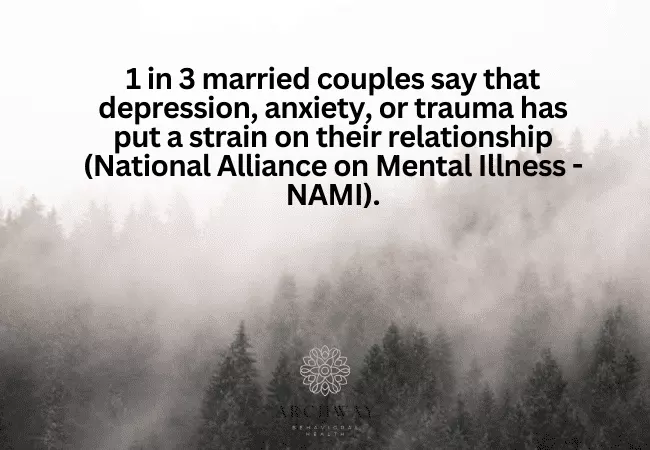Mental health challenges affect not only individuals but also their relationships. When one or both partners struggle with anxiety, depression, trauma, or bipolar disorder, it can lead to communication breakdowns, emotional distance, and increased stress. According to the American Psychological Association (APA), nearly 40% of couples report that mental health concerns play a significant role in relationship difficulties.
For couples facing these challenges, Couples Therapy at a trusted Mental Health Treatment Center can provide a structured approach to improving emotional connection, communication, and overall relationship health. At Archway Behavioral Health, we integrate evidence-based mental health treatment services with relationship counseling to ensure both partners receive the support and tools necessary for a healthy, fulfilling relationship.
This guide explores how mental health conditions affect relationships, the benefits of Couples Therapy, the evidence-based approaches used in treatment, and how therapy can be integrated into a comprehensive mental health recovery plan.
How Mental Health Issues Affect Relationships
Mental health struggles can put a significant strain on relationships, making it difficult for couples to connect emotionally and communicate effectively.
Communication Barriers
Mental health conditions like anxiety and depression often lead to withdrawal, avoidance, or difficulty expressing emotions. This can result in misunderstandings, frustration, and resentment between partners.
Increased Conflict and Emotional Distance
Mood disorders such as bipolar disorder can cause emotional highs and lows that make relationship dynamics unpredictable. Trauma and post-traumatic stress disorder (PTSD) can lead to emotional numbness, trust issues, and detachment.
Stress on the Caregiver Partner
When one partner struggles with mental health challenges, the other may take on a caretaker role, leading to an imbalance in the relationship. Over time, this can result in emotional exhaustion, burnout, and codependency.
Unhealthy Coping Mechanisms
Some individuals turn to unhealthy coping strategies, such as substance use, avoidance, or self-isolation, to manage stress. These behaviors can further strain the relationship and increase the risk of co-occurring substance use disorders.
Couples Therapy provides structured, professional support to help partners navigate these challenges, rebuild trust, and improve emotional connection.
What Is Couples Therapy and How Can It Help?
Couples Therapy is a form of relationship counseling designed to help partners:
- Understand how mental health conditions impact their relationship.
- Improve communication and emotional expression.
- Develop conflict resolution and problem-solving skills.
- Strengthen intimacy and trust.
- Establish healthy coping mechanisms for stress and mental health challenges.
At Archway Behavioral Health, Couples Therapy is integrated into our mental health treatment programs to ensure that both partners receive personalized care while also working on their relationship.
Evidence-Based Therapies Used in Couples Counseling
Cognitive Behavioral Therapy (CBT)
CBT is one of the most effective therapies for treating both individual mental health issues and relationship challenges.
How CBT Helps Couples:
- Identifies negative thought patterns that contribute to relationship stress.
- Teaches healthy communication techniques to reduce misunderstandings.
- Helps partners recognize and change destructive behaviors that may be harming their relationship.
CBT is highly effective for couples where one or both partners struggle with anxiety, depression, or trauma.
Dialectical Behavioral Therapy (DBT)
DBT is particularly beneficial for couples dealing with bipolar disorder, PTSD, or emotional dysregulation.
Key DBT Skills Taught in Couples Therapy:
- Mindfulness techniques to stay present and reduce emotional reactivity.
- Distress tolerance skills to manage stress without escalating conflicts.
- Emotional regulation strategies to help individuals maintain self-control during disagreements.
- Interpersonal effectiveness techniques to improve communication and strengthen relationships.
DBT helps couples navigate high-conflict situations and supports individuals with intense emotions or past trauma histories.
Trauma-Focused Therapy for PTSD and Emotional Healing
For couples where one or both partners have experienced trauma, specialized Trauma Treatment Programs can be integrated into Couples Therapy.
How Trauma Therapy Helps Couples:
- Provides a safe space to process past trauma without judgment.
- Helps partners understand trauma-related triggers and responses.
- Strengthens trust and emotional security in the relationship.
Addressing trauma in therapy can significantly improve emotional closeness and communication between partners.
Individual Therapy in Addition to Couples Therapy
Individual Therapy is often recommended alongside Couples Therapy to help each partner:
- Process personal mental health struggles.
- Develop self-awareness and emotional stability.
- Learn self-care strategies to improve their role in the relationship.
At Archway Behavioral Health, we offer comprehensive treatment plans that combine Couples Therapy, Individual Therapy, and evidence-based mental health treatment services to promote healing on both personal and relationship levels.
Integrating Couples Therapy into a Mental Health Treatment Plan
For couples facing significant mental health challenges, a structured treatment approach may be necessary.
Partial Hospitalization Program (PHP)
A PHP provides full-day therapy and psychiatric care while allowing individuals to return home in the evening. It is ideal for individuals experiencing severe mental health symptoms.
This program includes:
- CBT, DBT, and trauma therapy.
- Individual Therapy for both partners.
- Couples Therapy sessions to address relationship challenges.
Intensive Outpatient Program (IOP)
An IOP offers structured mental health support with a flexible schedule, making it ideal for couples balancing work and treatment.
This program includes:
- Therapy sessions multiple times per week.
- Tools to strengthen relationships while managing mental health symptoms.
Outpatient Therapy for Long-Term Support
For couples who have completed more intensive programs, Outpatient Therapy provides continued support through weekly therapy sessions focused on relationship maintenance and long-term mental health management.
Why Choose Archway Behavioral Health for Couples Therapy?
At Archway Behavioral Health, we offer:
- Comprehensive mental health treatment integrated with Couples Therapy.
- Licensed therapists trained in evidence-based relationship counseling.
- Personalized treatment plans tailored to each couple’s needs.
- Multiple levels of care, including PHP, IOP, and outpatient therapy.
We are committed to helping couples navigate mental health challenges while strengthening their emotional connection, communication, and resilience.
Take the First Step Toward Healing Your Relationship
If mental health challenges are impacting your relationship, Couples Therapy at Archway Behavioral Health can help. Whether you need intensive support through PHP, flexible therapy through IOP, or long-term counseling, we provide personalized, evidence-based care to help you and your partner thrive.
Start Your Journey to Healing Today
- Call Archway Behavioral Health at 888.488.4103 for a confidential consultation.
- Schedule an assessment to explore the best treatment plan for you and your partner.
- Begin rebuilding trust, strengthening your connection, and finding emotional balance together.
Your relationship deserves the best care. Let Archway Behavioral Health help you heal and grow—together.
Frequently Asked Questions (FAQ)
What is Couples Therapy for mental health?
Couples Therapy is a structured form of counseling that helps partners navigate the impact of mental health challenges on their relationship. It focuses on improving communication, emotional connection, conflict resolution, and coping strategies to support long-term relationship health.
How can Couples Therapy help if one or both partners have a mental health condition?
Couples Therapy can help by:
- Addressing communication barriers caused by anxiety, depression, or trauma.
- Teaching conflict resolution skills to reduce relationship strain.
- Providing emotional support for partners struggling with mental health symptoms.
- Strengthening trust, intimacy, and overall relationship resilience.
What mental health conditions can be addressed through Couples Therapy?
Couples Therapy is beneficial for partners dealing with:
- Anxiety disorders
- Depression and mood disorders
- Post-Traumatic Stress Disorder (PTSD)
- Bipolar disorder
- Co-occurring substance use and mental health conditions
What therapy approaches are used in Couples Therapy at Archway Behavioral Health?
We use evidence-based therapies, including:
- Cognitive Behavioral Therapy (CBT) to reshape negative thought patterns.
- Dialectical Behavioral Therapy (DBT) for emotional regulation and distress tolerance.
- Trauma-Informed Therapy for couples affected by PTSD or past trauma.
- Individual Therapy for each partner, alongside joint sessions.
How does mental health treatment integrate with Couples Therapy?
At Archway Behavioral Health, Couples Therapy is part of a comprehensive mental health treatment plan, including:
- Partial Hospitalization Program (PHP) for structured, intensive care.
- Intensive Outpatient Program (IOP) for flexible mental health support.
- Outpatient Therapy for long-term relationship and emotional wellness.
Can I attend Couples Therapy if my partner is not ready?
Yes, Individual Therapy can still help you improve your communication and coping skills while encouraging your partner to join when they feel ready.



